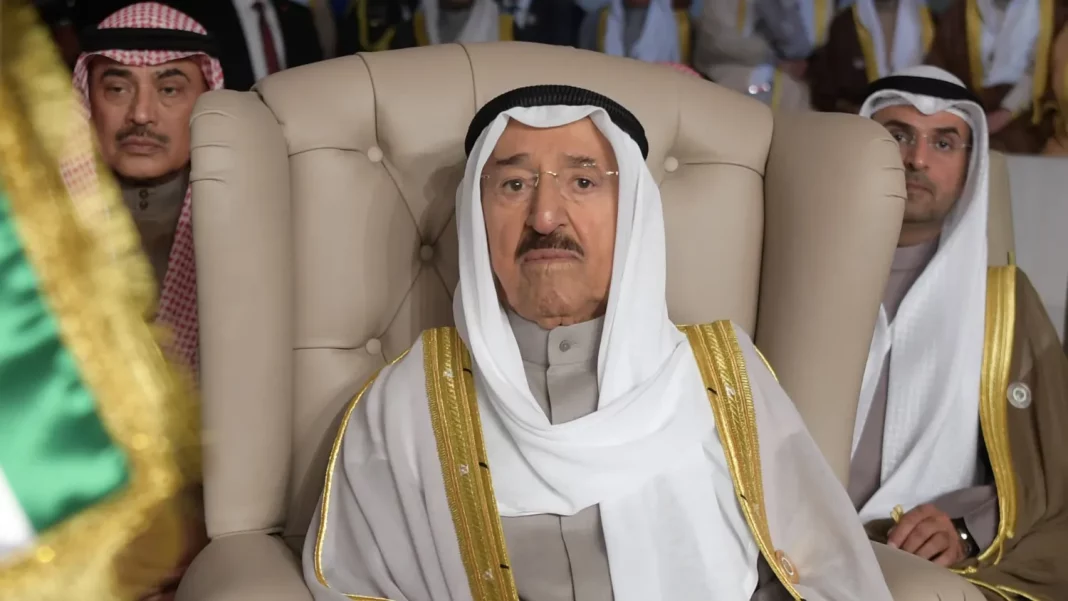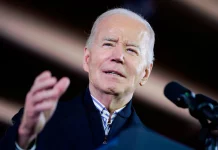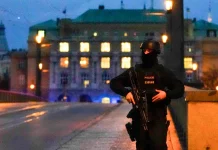Early Life and Education
Nawaf’s formative years in Kuwait: Nawaf went to various schools in Kuwait, such as Hamada, Sharq, Al-Naqra, Eastern, and Mubarakiya, for his early education. He learned Arabic language, Islamic studies, and Kuwaiti culture and history from these schools, which gave him a solid foundation.
Sandhurst Military Academy training: Nawaf was 20 years old when he went to the renowned Sandhurst Military Academy in the United Kingdom in 1957. Sandhurst has a reputation for its tough training and has produced many famous military leaders in history. Nawaf learned military tactics, leadership, and discipline at Sandhurst.
Back to Kuwait and military service: Nawaf joined the Kuwaiti Army after he graduated from Sandhurst in 1959. He showed his military skills and leadership abilities and climbed up the ranks quickly. He became Commander of the Land Forces by 1961.
Nawaf’s early life and education influenced him greatly and made him the leader he was. He gained a deep understanding of his country’s traditions and culture from his education in Kuwait, and he developed a sense of discipline, leadership, and strategic thinking from his military training at Sandhurst. These qualities helped him throughout his long and illustrious career.
Military and Political Career
Nawaf Al-Ahmad Al-Jaber Al-Sabah had a long and distinguished career in Kuwait’s military and political arenas, spanning six decades of the nation’s history. Here are some of his notable achievements in these fields:
Military Excellence
Modernization and Development: As the Defense Minister (1971-1988), Nawaf worked on enhancing the Kuwaiti Armed Forces. He acquired advanced weapons, such as fighter jets and tanks, and arranged training programs with Western allies. This modernization prepared the forces for a better defense against possible threats. Strategic Leadership: During the 1973 Arab-Israeli War, Nawaf was instrumental in mobilizing Kuwait’s troops for possible participation. His grasp of regional dynamics and dedication to regional security were essential in managing this stressful period. Resolute Response to Invasion: The 1990 Iraqi invasion posed an unprecedented challenge. As the Defense Minister, Nawaf cooperated with coalition forces to free Kuwait. His strategic thinking and partnership with allied powers were key in the country’s ultimate liberation. Political Astuteness:
Navigating Internal Security: Nawaf’s term as the Interior Minister (1961-1971 and 1992-2003) demonstrated his ability to preserve internal stability. He restructured the police force, dealt with issues of tribalism, and handled security threats from domestic groups. His focus on community involvement and trust-building created a safer environment for Kuwaiti citizens. Diplomacy and Regional Cooperation: Throughout his career, Nawaf advocated for regional cooperation and diplomatic solutions. He played a major role in resolving inter-Gulf conflicts and strengthening ties with Arab and Muslim nations. His commitment to advancing regional stability earned him respect and influence among Gulf leaders. Modernization and Economic Development: As the Deputy Prime Minister (2001-2006), Nawaf contributed to Kuwait’s economic diversification efforts. He supported initiatives to decrease reliance on oil, encourage private sector investment, and improve infrastructure. His focus on long-term economic prosperity paved the way for future generations. Beyond the Official Roles:
Beyond the formal roles and responsibilities, Nawaf’s understanding of Kuwaiti society and his ability to bridge gaps were remarkable. He maintained close relationships with tribal leaders, religious figures, and ordinary citizens, ensuring their voices were heard. This inclusive approach fostered national unity and social cohesion, crucial elements in navigating political complexities.
Nawaf Al-Ahmad Al-Jaber Al-Sabah’s military and political career showed both strategic skill and a deep commitment to Kuwait’s security and prosperity. His contributions to modernization, regional cooperation, and internal stability established his place as a significant figure in Kuwait’s history and a leader who navigated turbulent times with unwavering dedication to his nation.
Sheikh Nawaf as Emir of Kuwait
Sheikh Nawaf’s short tenure as Emir of Kuwait was characterized by a strong dedication to maintaining and enhancing the country’s stability and progress amid various challenges. Here are some of the key events and initiatives that shaped his rule as the 16th leader of the nation:
Continuity and Modernization
Nawaf became the Emir in September 2020, after his half-brother, Sheikh Sabah Al-Ahmad Al-Sabah, passed away. He acknowledged the important role his predecessor had in building modern Kuwait and followed Sheikh Sabah’s policies of economic diversification, infrastructure development, and social advancement.
Economic Diversification: He sought to lessen Kuwait’s reliance on oil income by supporting non-oil sectors such as tourism, technology, and renewable energy. Initiatives involved setting up the Kuwait National Development Fund and initiating mega-projects like the Silk City economic zone.Infrastructure Development: He gave ongoing attention to major infrastructure projects like the Kuwait Integrated Metro and Al-Zour North Power Plant, aiming to improve transportation and strengthen energy security.
Social Advancement: He continued to work on improving education, healthcare, and women’s empowerment. He endorsed the National Strategy for Sustainable Development Goals, aiming to tackle social inequalities and boost human capital.
Navigating Internal Challenges
Nawaf faced some internal difficulties while pursuing continuity
Political Discord: There was friction between the legislative and executive branches, resulting in parliamentary dissolutions and delays in vital reforms. Nawaf tried to narrow the gap through dialogue and cabinet reshuffles but ultimately encountered disappointment over lack of progress. Economic Woes: The COVID-19 pandemic and falling oil prices worsened Kuwait’s economic slowdown. Balancing fiscal austerity with social welfare became a tricky task, and Nawaf’s efforts to implement some austerity measures met public resistance. Foreign Policy and Geopolitical Landscape:
On the global stage, Nawaf’s rule witnessed
Maintaining Regional Ties: He sustained close relationships with Gulf Cooperation Council (GCC) states, stressing regional cooperation and stability. Kuwait played a key role in mediating disputes within the GCC and encouraging joint economic ventures. Global Alliances: Nawaf confirmed Kuwait’s commitment to strategic partnerships with the United States and other Western nations, concentrating on security cooperation and defense collaborations.
Humanitarian Role: Kuwait under Nawaf preserved its tradition of active humanitarian involvement. The country offered significant aid to refugees and conflict zones, cementing its reputation as a global leader in humanitarian relief efforts.
Legacy and Beyond
Nawaf’s legacy is that of a leader who valued stability and unity during a tough period. While his rule faced some internal and external obstacles, his focus on continuity, economic diversification, and regional cooperation contributed to ensuring Kuwait’s ongoing progress. His death in July 2023 opened a new chapter for the nation, with his half-brother, Sheikh Meshal Al-Ahmad Al-Jaber Al-Sabah, taking the throne and inheriting the duty of steering Kuwait’s future.
Family and Relationships
Weddings and Offspring: Nawaf had two marriages in his life. His first wife, Sheikha Sharifa Al-Duaij Al-Sabah, who gave birth to six of his children, tragically died in 2001. He later married Sheikha Fariha Al-Ahmad Al-Jaber Al-Sabah, who was the mother of his youngest three children.
Loving Family Man: Nawaf valued family time above his demanding public role. He had close bonds with his children and grandchildren, and enjoyed attending family events and marking special occasions together.
Admirer of Traditions: Nawaf treasured Kuwaiti traditions and customs. He frequently joined in cultural activities, celebrating national heritage and strengthening a sense of community within the royal family.
Interests and Passions
Passionate Falconer: Falconry was a lifelong interest for Nawaf, deeply connected to Bedouin culture. He kept a falconry mews and joined in traditional hunting trips, cultivating a relationship with his country’s heritage.
Sports Fan: Nawaf was an avid supporter of sports, especially football. He followed the Kuwaiti national team closely and even played the sport in his younger days. His devotion to advancing sports as a unifying factor in society was widely recognized.
Charitable Endeavors: Nawaf’s dedication went beyond his immediate family and interests. He backed various charitable causes, concentrating on education, healthcare, and social welfare initiatives. His charitable efforts showed his commitment to enhancing the lives of Kuwaiti citizens.
Personality Traits
Modesty and Respect: Nawaf was known for his modesty and respect towards all people, no matter their background. He often mingled with ordinary citizens, earning him the respect of the public.
Cool and Collected Demeanor: Nawaf kept a cool and collected demeanor even in the face of challenges. His calm nature and ability to handle complex situations with grace were useful assets during his reign.
Sense of Humor: While Nawaf’s public image conveyed seriousness, those close to him said he had a dry humor and a fun-loving sense of humor. This personal touch made him closer to his family and friends.
Legacy
For more than 60 years, Nawaf Al-Ahmad Al-Jaber Al-Sabah was a leader who earned the respect of his nation. He is remembered for his commitment to stability, his dedication to public service, and his unwavering love for Kuwait. He served as the crown prince of Kuwait and helped the ruler in governing the country. He also occupied several important roles in the Kuwaiti government, such as minister of defense, minister of interior, and deputy commander-in-chief of the Kuwait Armed Forces . He was admired for his diplomacy and leadership skills, both at home and abroad. He played a significant role in maintaining peace and stability in the Gulf region, resolving conflicts and fostering positive relationships with neighboring countries. He was also a devoted father of six children, who inherited his passion for public service. Nawaf Al-Ahmad Al-Jaber Al-Sabah left behind a legacy of stability, public service, and devotion to Kuwait.
Passed Away on 16 December 2023
Nawaf Al-Ahmad Al-Jaber Al-Sabah, the former Emir of Kuwait, passed away on 16 December 2023 at the age of 86. He had been hospitalized for a sudden health issue before his death. Throughout Kuwait’s history and politics, he held positions such as Minister of Interior, Minister of Defense, and Deputy Prime Minister before becoming Emir in 2020. During his reign, he was known for granting pardons to resolve internal conflicts and improve the well-being of the nation. After his passing, his half-brother Sheikh Mishal Al-Ahmad Al-Jaber Al-Sabah took over as Emir.





